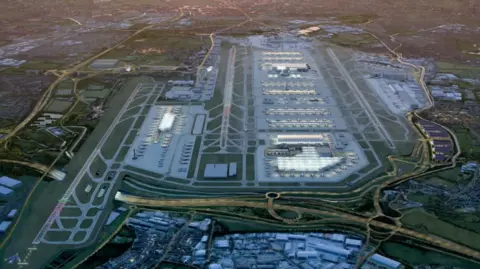### Heathrow Expansion Declared ‘Essential’ Following Record-Breaking Passenger Numbers
In an assertion underlining the need for expansion, Heathrow Airport has deemed the development of additional facilities “essential,” following the terminal’s busiest month ever in May. The air travel hub processed over 7.2 million passengers during this period, representing a growth of 0.4% compared to the same month last year. This surge in passenger numbers has prompted officials at Heathrow to reflect on the challenges posed by increased demand alongside a restricted physical space.
A representative from Heathrow conveyed the airport’s outlook by stating, “As these record numbers become the norm, it’s time to start an honest conversation about the challenges this presents for an already space-constrained yet highly efficient hub.” This remark has been framed within the context of sustained operations managing high volumes of air traffic, prompting the airport’s executives to look towards expansion as a viable solution to accommodate continued growth.
Conversely, the proposal for expansion faces considerable opposition. Critics argue that increasing the capacity of Heathrow Airport would significantly hinder the United Kingdom’s efforts to adhere to climate change commitments. Prominent figures, such as the Mayor of London, Sir Sadiq Khan, have openly expressed their disagreement with plans to add a third runway at the airport, primarily citing concerns regarding heightened noise pollution and air quality deterioration that might arise from increased air travel.
### Backing and Opposition for Expansion Plans
The discourse surrounding the expansion has revealed a broader debate about balancing infrastructural growth with environmental responsibilities. The Heathrow spokesperson reiterated, “Heathrow continues to deliver excellent service, but to sustain this performance and meet future demand, expanding capacity will be essential.” This sentiment reinforces the argument for necessary growth, yet it stands in stark contrast with the anti-expansion viewpoints which underscore the potential environmental impacts.
In past initiatives, the airport has announced intentions to submit detailed plans for a third runway to the government during the summer months. Voices from within the government have shown support for these plans, including Chancellor Rachel Reeves, who acknowledged the need for infrastructural development during a speech focused on economic growth in January. Despite the backing, Heathrow’s efforts have encountered multiple postponements spanning decades, predominantly due to significant environmental apprehensions.
### Community Impact and Environmental Concerns
Environmental advocacy groups have not missed the opportunity to critique the expansion efforts. Friends of the Earth, a notable organization in the environmental activism sphere, has characterized the expansion proposals as “hugely irresponsible.” This criticism emphasizes the belief that the projected increase in emissions and air traffic would not be beneficial to the UK economy at large, but rather would primarily benefit frequent travelers.
Adding to the discourse, Alethea Warrington, the head of aviation at the climate charity Possible, has articulated a staunch stance against the planned expansion. She stated, “This huge increase in emissions won’t help our economy and would just encourage the small group of frequent flyers who take most flights.” These sentiments reflect a broader apprehension regarding the ecological footprint of the aviation industry, especially in light of the growing urgency to address climate change.
The real-world implications of proposed expansions have resonated through affected communities as well. Residents living in proximity to the airport, particularly those in the village of Harmondsworth, have expressed profound concerns about the potential for significant displacement, suggesting that “three-quarters of the village would be demolished,” effectively erasing their viable community. This sentiment illustrates the human cost of infrastructural ambitions and puts a face to the broader debate, underlining the significant ramifications beyond just operational efficiency.
### Conclusion
As Heathrow navigates the complexities of expansion amid a surge in passenger traffic, the dialogue highlights both the economic and environmental dimensions critical to this debate. The airport’s aspirations for increased capacity must be reconciled with genuine concerns from the community and environmentalists alike, presenting a challenge that calls for a balanced and sustainable approach in addressing the future of air travel in the UK.











